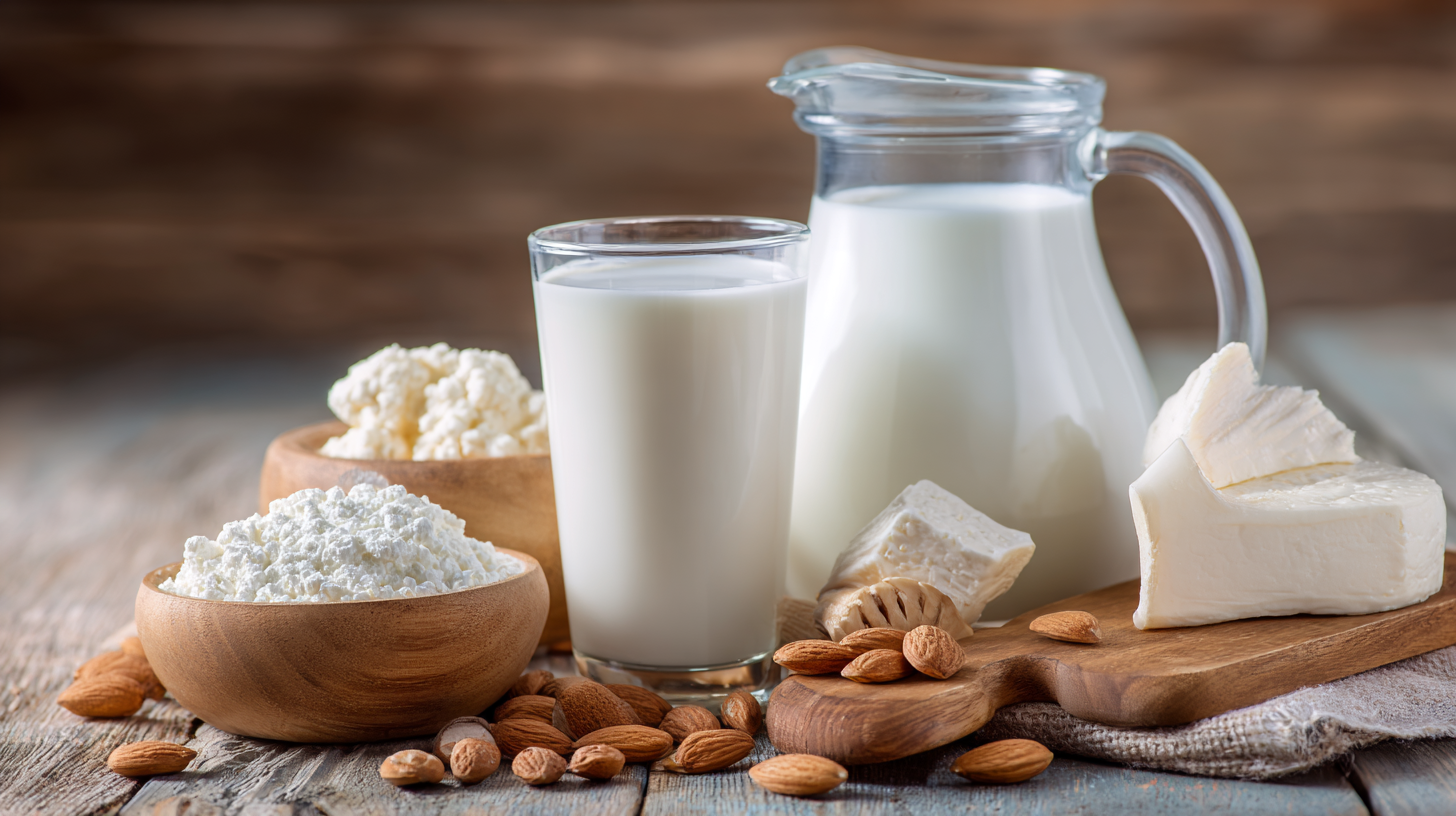
Top 10 Must-Try Dairy Milk Products for a Healthier Lifestyle
In recent years, the demand for milk products dairy has surged as more consumers recognize the significant health benefits they offer. According to a report by the International Dairy Federation, dairy products are a vital source of essential nutrients, providing high-quality protein, calcium, and vitamins that contribute to overall well-being. With the global dairy market projected to reach over $700 billion by 2026, it is evident that more people are looking to incorporate nutritious dairy options into their diets.
Dr. Jane Foster, a leading nutrition expert and author of "The Dairy Connection", emphasizes the importance of selecting high-quality dairy products: "Incorporating a variety of dairy options can enhance dietary diversity and improve health outcomes."
This statement reflects the growing trend of adopting dairy as a foundational element of a balanced diet. From fortified milk to probiotic-rich yogurt, there are numerous innovative dairy products designed to cater to health-conscious consumers.
As we delve into the top 10 must-try dairy milk products, it becomes clear that these offerings not only satisfy taste preferences but also provide essential nutrients that are crucial for maintaining a healthier lifestyle. Join us as we explore these delectable and nutritious choices that can seamlessly fit into your daily routine while benefiting your health.

Top 10 Dairy Milk Products Packed with Nutrients for Optimal Health
Dairy milk products are not just a source of hydration; they also pack a nutritional punch that can significantly contribute to a healthier lifestyle. According to the Dietary Guidelines for Americans, dairy products are a rich source of essential nutrients such as calcium, vitamin D, and potassium. For instance, a single cup of low-fat milk provides approximately 30% of the daily recommended calcium intake, which is crucial for maintaining strong bones and teeth. Additionally, the protein content in dairy milk aids in muscle growth and repair, making it an excellent post-workout beverage.

Recent studies published by the International Dairy Foods Association demonstrate that incorporating dairy into a balanced diet can lead to improved overall health outcomes. Individuals who consume dairy products regularly have been found to have a lower risk of developing chronic diseases, such as heart disease and osteoporosis. Furthermore, whole milk variants have been shown to contain beneficial fatty acids, which have been linked to better cardiovascular health. With many delicious options available—ranging from fortified yogurts to nutrient-rich cheeses—dairy milk products offer diverse choices for enhancing one's nutrient intake while enjoying tasty meals and snacks.
Impact of Calcium-Rich Dairy Milk in Reducing Osteoporosis Risk
Calcium plays an essential role in maintaining bone health, particularly in terms of reducing the risk of osteoporosis. According to the National Institutes of Health, the Recommended Dietary Allowance (RDA) for calcium is 1,000 mg per day for most adults, increasing to 1,200 mg for women over 50 and men over 70. Dairy milk is one of the richest sources of calcium available, with an 8-ounce serving of whole milk providing approximately 300 mg of calcium. Consuming adequate amounts of dairy milk can significantly contribute to fulfilling the daily calcium requirements necessary for optimal bone density.
In addition to calcium, dairy milk also contains other vital nutrients such as vitamin D, protein, and magnesium, all of which work synergistically to support bone health. A study published in the Journal of Bone and Mineral Research found that individuals who consumed recommended amounts of dairy products had a 23% lower risk of developing osteoporosis compared to those who consumed minimal dairy. Incorporating sources of dairy milk into the daily diet not only aids in bone fortification but can also help mitigate age-related bone loss, making it an essential component of a healthy lifestyle.
Top 10 Must-Try Dairy Milk Products for a Healthier Lifestyle
This chart illustrates the calcium content in various dairy milk products and their potential impact on reducing osteoporosis risk. Higher calcium intake is associated with stronger bones and a lower risk of osteoporosis.
Exploring Probiotics: The Role of Fermented Dairy Products in Gut Health
Fermented dairy products have garnered significant attention in recent years, particularly for their role in promoting gut health. The fermentation process not only enhances the flavor and texture of dairy but also increases the bioavailability of nutrients. Probiotics, the beneficial bacteria found in these products, contribute to a balanced gut microbiome. Regular consumption of fermented dairy items like yogurt, kefir, and certain cheeses can aid in digestion, boost immunity, and may even alleviate some digestive disorders.
Incorporating these probiotic-rich dairy products into your diet supports a healthy gut environment, which is essential for overall wellness. For instance, yogurt is well-known for its probiotic content; however, varieties made from whole milk often contain added nutrients, such as calcium and vitamins, which further support optimal health. Similarly, kefir is a fermented beverage that not only provides probiotics but also a unique blend of yeast and bacteria, offering diverse health benefits. By exploring and including these dairy options in your meals, you can enhance your gut health while enjoying delicious flavors.
Low-Fat vs. Whole Milk: Which Dairy Option Supports Weight Management Better?
When it comes to choosing between low-fat and whole milk, understanding their roles in weight management is crucial for a healthier lifestyle. Low-fat milk contains significantly fewer calories and less saturated fat, making it an appealing option for those focused on weight control. Studies indicate that individuals consuming low-fat dairy products can maintain a balanced caloric intake while still receiving essential nutrients like calcium and vitamin D. This choice supports weight management effectively by keeping overall fat consumption in check.
Conversely, whole milk, while higher in calories and fat, offers a rich flavor and can be more satisfying for some. This satisfaction could potentially lead to reduced snacking and overeating throughout the day. However, moderation is key; including whole milk in your diet may be beneficial in small amounts if it provides satiety without exceeding your caloric needs.
Tips: Opt for low-fat milk if your primary goal is weight loss. Pair it with high-fiber foods to enhance fullness. If you prefer whole milk, consider using it in smoothies or recipes where flavor is essential, ensuring you’re mindful of portion sizes. Always listen to your body and adjust your dairy choices based on your specific dietary needs and goals.
The Benefits of Fortified Dairy Milk in Meeting Daily Vitamin D Requirements
Dairy milk plays a significant role in achieving a healthier lifestyle, particularly when it comes to fulfilling daily vitamin D requirements. Fortified dairy milk is an excellent source of this essential nutrient, which supports bone health, immune function, and has been linked to improved mood. Many people struggle to get enough vitamin D through sunlight exposure alone, especially during winter months or for those living in northern latitudes. Thus, incorporating fortified dairy milk into your diet can be a simple yet effective solution.
When choosing dairy milk, opt for varieties that are fortified with vitamin D to maximize health benefits. Look for brands that specify the amount of vitamin D added on their packaging. Furthermore, if you're lactose intolerant or prefer plant-based options, some almond, soy, or oat milk products are also fortified with vitamin D. Pairing fortified dairy milk with a balanced diet rich in fruits, vegetables, and whole grains can enhance overall nutrient absorption and promote better health.
Tips for integrating fortified dairy milk into your daily routine include adding it to smoothies, using it in cereal, or opting for it in your coffee or tea. Consider creating your own nutritious milk-based beverages, such as a homemade latte or a fruit smoothie, to ensure you are not only meeting your vitamin D needs but also enjoying delicious flavors throughout the day.

Related Posts
-

Exploring the Rise of Sustainable Cow Products in Modern Eco-Friendly Living
-

Discover the Best Dairy Products Online for a Healthier Lifestyle
-

Unlocking the Secrets of Dairy: How Milk Transforms Nutrition and Wellness
-

Essential Dairy Barn Equipment Upgrades for Modern Farming Efficiency
-

Exploring the Health Benefits of Consuming Diverse Milk Products in Your Daily Diet
-

Exploring Sustainable Products of Dairy Farming and Their Impact on Global Nutrition
